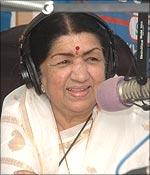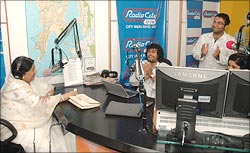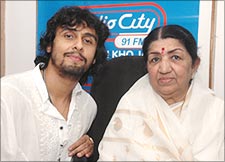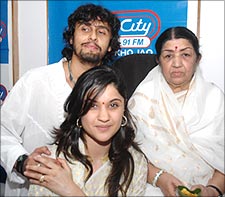|
|
| Help | |
| You are here: Rediff Home » India » Movies » Interviews » Lata Mangeshkar |
|
 Lata Mangeshkar | ||
| |||||||||||||||||||||||
|
| |||||||||||||||||||||||
Lata Mangeshkar turned 77 on September 28, and we have a treat for you. Join rediff.com in wishing the living legend a very Happy Birthday, and also tell us which of her songs you simply can't get enough of.
Then, scroll down and read an excerpt from one of Lataji's longest interviews, conducted by none other than Bollywood's current top singer Sonu Nigam [Images]. Lataji obliged Nigam on his birthday recently, and agreed to be interviewed by him for the show Kasa Kay Mumbai, on the radio channel Radio City, with whose kind courtesy we reproduce excerpts from this eclusive interview.
Over to Lataji and Sonu, and radio jockey Archana Pania:
Archana: This is Archana on 91 FM. You have been listening to my voice every morning on Kasa Kay Mumbai. But today, you won't hear me on the show. Instead, you will hear a very beautiful voice. I won't be able to speak today.
I am on the verge of a historic moment that means a lot to me. I thank Radio City and really, really thank my stars for giving me this chance. For all the listeners out there, today you will get a chance to listen to Lata Mangeshkar [Images] and Sonu Nigam and interact with them.
 Sonu: My namaskaar to all listeners. I don't know what to say. At about 1:30 this morning, I was at home, discussing this interview and wondering what to talk about. I thought we would all start weeping, but I am cool now. First of all, on behalf of Radio City and all its listeners, thank you very, very much for coming here, Lata Mangeshkarji. I do not understand how I should speak to you. I don't think of myself as a radio jockey. How do I interview a legendary personality such as yourself?
Sonu: My namaskaar to all listeners. I don't know what to say. At about 1:30 this morning, I was at home, discussing this interview and wondering what to talk about. I thought we would all start weeping, but I am cool now. First of all, on behalf of Radio City and all its listeners, thank you very, very much for coming here, Lata Mangeshkarji. I do not understand how I should speak to you. I don't think of myself as a radio jockey. How do I interview a legendary personality such as yourself?
You have done thousands of interviews, so I think I will do something different. At first, I want to say I can't believe you are here. Please say a few words, so our listeners can hear your voice and feel your smile.
Lata: Namaskaar to all Radio City listeners.
Sonu: Didi, when you entered the studio -- although you are used to all of this -- people are meeting you for the first time. They fell at your feet and started weeping. I have met you many times before, but today, after meeting you, I am also weeping. How did you make this happen?
Lata: I have not made it myself. This is God-given. I have not done anything.
Sonu: I knew you would say this. You are so humble that people love you more. How did you reach such heights, where people love you so much and worship you?
Lata: Actually, I do not deserve this. But, at the same time, I feel this is God's will, who sent me here to do something big.
Sonu: But you have continued. Some people become boring, they think they have done enough and want to enjoy themselves. How do you continue?
Lata: If you love your work, and if you are sincere, it happens automatically. I have been singing for so many years that I can't think of anything else.
 Sonu: Really. Like a priest worships his God, you worship your music. And you are so much in love with it that you have become the goddess of music. Didi, you are so shy. Why are you not so open with the public? Your close circle know you are very naughty and have a good sense of humour. Although, neither do you expose yourself nor do you go anywhere. What made you accept this invitation to Radio City?
Sonu: Really. Like a priest worships his God, you worship your music. And you are so much in love with it that you have become the goddess of music. Didi, you are so shy. Why are you not so open with the public? Your close circle know you are very naughty and have a good sense of humour. Although, neither do you expose yourself nor do you go anywhere. What made you accept this invitation to Radio City?
Lata: I came because of you. You asked, and I decided to come.
Sonu I can do nothing in return, except say Thank You.
Lata: There is no need.
Sonu: I think most people know about you and your history. This programme is not only for those who know you and who are listening in, but for newer generations. I want to start with your background. We all know you were born in Indore. Please tell us about your childhood. You are related to Kolhapur, and also to Goa [Images]...
Lata: I am related to all of India.
Sonu: Yes, you are related to the entire world. People get up every morning singing your songs.
Lata: My father had a drama company. My mother was pregnant and my grandmother asked her to come to Indore because, according to Hindu rituals, the first child is always born at the mother's place. So, my mother went to Indore. Her sister was also there. After I was born, we came back to my father's company and travelled with it. My childhood passed with us travelling from one place to another. Somewhere in 1930-31, my father closed the drama company and started a film company. From then on, we lived in Sangli, around 30 minutes from Kolhapur.
Sonu: How are you related to the Mangeshi temple in Goa?
Lata: My father is from Mangeshi. He was born near the temple.
Sonu: The entertainment business has risen to such an extent that even a newcomer in the industry earns a fair amount of money. The number of shows has also risen. One can even cut one's own album. But, in the old days, there wasn't much hype. As you said, your father had a drama company. Was it financially stable?
 Lata: It was very good. The company made good money. My father sang very well.
Lata: It was very good. The company made good money. My father sang very well.
Sonu: Dinanath Mangeshkar.
Lata: Yes, and I learnt singing from him. He taught me for just a few days and died when I was only 13. After his death, I started to work with film.
Sonu: I want to know about your father's nature. What was he like? What did he call you?
Lata: He loved me very much. He loved all children, but I was special for him. He used to call me 'Lata Baba.' But when he was angry, we were afraid of him. He never raised his hand on us, but his look alone could make us cry.
Sonu: I think you also have nice, big eyes like your father.
Lata: His eyes were very nice.
Sonu: Now, I need some time to relax because I am not a great radio jockey.
The song Ghar Aaja, Ghir Aaye Badara plays
Sonu: I like this song.
Lata: It is the first one I sang for R D Burman.
Sonu: Superb!
Lata: When he was first composing this song, there was a misunderstanding between us. I couldn't get the right tune. RD thought I had a fight with Dada (Sachin Dev Burman, Rahul Dev Burman's father), which is why I wasn't singing. But later, Dada called and told me to sing for RD.
Sonu: Oh! There was a fight, but you still had affection for each other.
Lata: We had lot of affection among us. Dada told me to sing, so I rehearsed and recorded this -- my first song for Pancham.
Sonu: You must have seen him when he was very young.
Lata: Yes, I did. One day, when I was recording for Dada, he came and stood beside me and asked me for an autograph. He took his diary and kept it in front of me. I wrote, 'Do not do anything mischievous.' He became very angry and asked me if I thought he was naughty.
Sonu: People have enjoyed listening to these songs and to us.
Excerpted from the translated transcript of the radio show, Kasa Kay Mumbai, which featured Lata Mangeshkar and Sonu Nigam on July 30, with the permission of 
|
|
| © 2008 Rediff.com India Limited. All Rights Reserved. Disclaimer | Feedback |